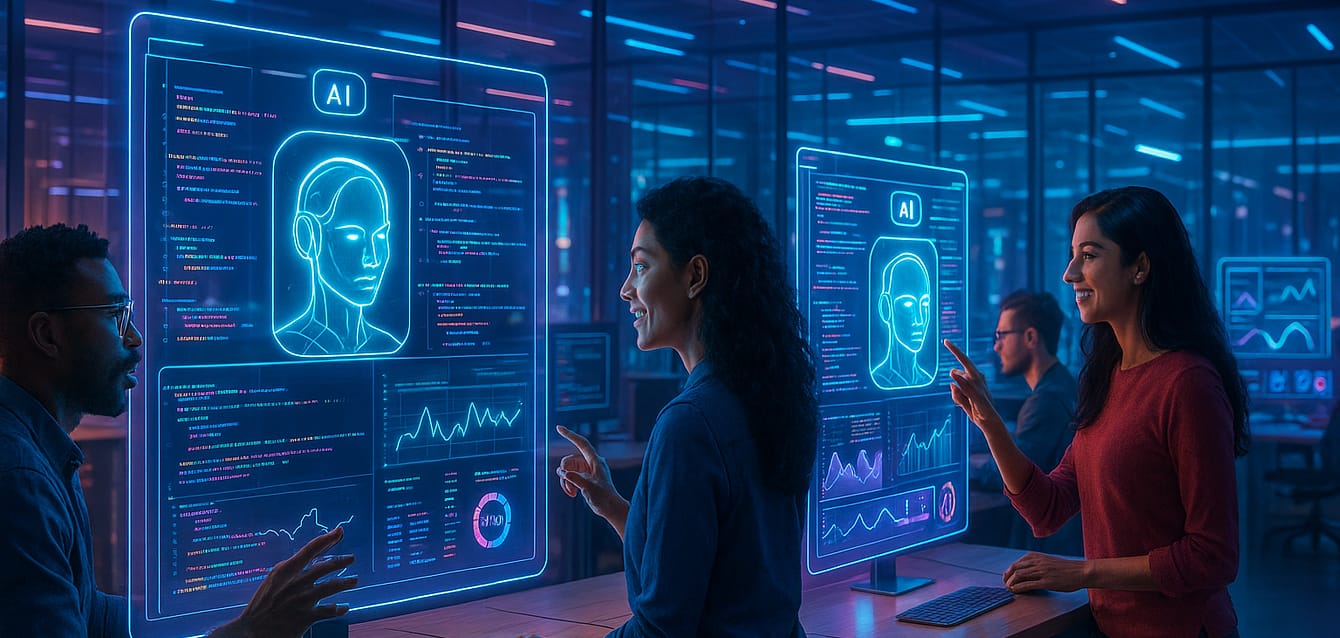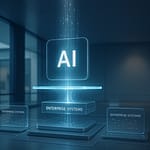🚀 Introduction: The New Era of Intelligent Development
The software development landscape is evolving faster than ever. In 2025, artificial intelligence (AI) is no longer an optional tool it’s a core driver of efficiency, innovation, and quality. From automated coding to predictive analytics for DevOps, AI is transforming how software is designed, built, tested, and deployed.
For small, mid-sized, and enterprise organizations, embracing AI in software development isn’t just about staying competitive it’s about unlocking faster time-to-market, reducing errors, and optimizing resources.
🌐 The AI-Powered Software Development Lifecycle
AI is now integrated into every stage of the software development lifecycle (SDLC):
- Requirement Analysis – AI tools analyze user stories, documentation, and legacy data to identify gaps and suggest optimal project scopes.
- Coding & Development – Generative AI models (like OpenAI Codex, Copilot, or custom LLMs) assist developers with auto-completion, code generation, and boilerplate creation, reducing manual effort.
- Testing & QA – AI automates test case generation, bug detection, and regression testing, catching errors before deployment and shortening QA cycles.
- Deployment & DevOps – Predictive AI models anticipate system failures, optimize CI/CD pipelines, and monitor performance in real-time.
- Maintenance & Optimization – AI identifies code inefficiencies, suggests refactoring, and predicts potential issues, ensuring software longevity and scalability.
Read A report on: IBM – AI in software development
⚡ Key Areas Where AI is Driving Transformation
1. Generative AI for Coding
Generative AI tools assist developers by automatically creating functional code snippets, APIs, and even complex modules. This reduces repetitive work and allows engineers to focus on innovation and architecture.
2. Intelligent Testing & Quality Assurance
AI-driven testing frameworks predict potential bugs, automate test execution, and simulate user interactions, improving software reliability and reducing release times.
3. Predictive DevOps & Deployment
AI models analyze historical deployments, system logs, and usage patterns to anticipate failures and optimize CI/CD pipelines. This results in more stable releases and lower downtime.
4. Enhanced Decision-Making & Project Management
AI-driven analytics provide insights into team productivity, sprint progress, and project risks, enabling better prioritization and resource allocation.
🏆 Benefits of AI in Software Development
- Faster Time-to-Market: Automated coding and testing accelerate the entire SDLC.
- Reduced Errors & Higher Code Quality: AI predicts bugs and suggests improvements proactively.
- Cost Efficiency: Less manual work translates to lower development costs.
- Scalability: AI supports complex, large-scale projects with distributed teams.
- Innovation Focus: Developers can focus on architecture and creative problem-solving instead of repetitive tasks.
Explore our AI for Software Development Services” → /ai-for-software-development-services
💼 Real-World Use Cases
- SaaS Companies: Automate feature development and regression testing using AI-powered coding assistants.
- FinTech: Predictive analytics and fraud detection models integrated directly into application workflows.
- Healthcare Apps: AI-driven testing ensures reliability in sensitive, regulated environments.
- E-commerce Platforms: Personalization algorithms and predictive inventory management optimized with AI.
🔮 The Future: AI-First Software Development
By 2025, AI won’t just assist development it will actively participate in decision-making and coding. Organizations adopting AI-driven development pipelines will see:
- Significant reductions in project delays
- Fewer production bugs
- Smarter resource allocation
- Faster innovation cycles
For businesses aiming to stay ahead in digital transformation, integrating AI into software development is no longer optional it’s essential.
Start your AI-powered development journey today.
👉 Explore AI for Software Development Services






